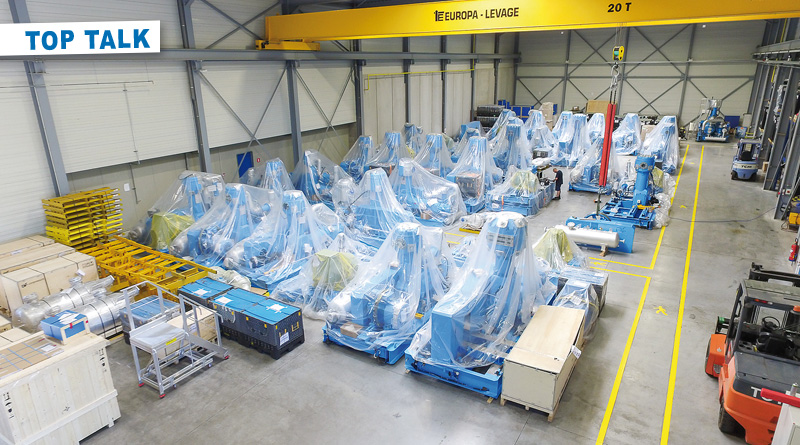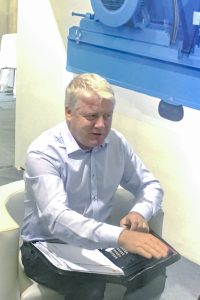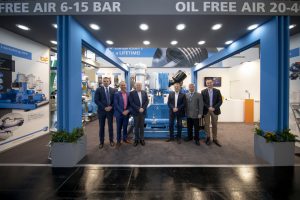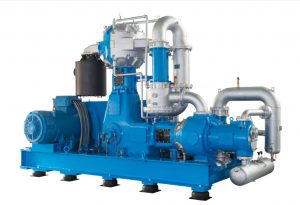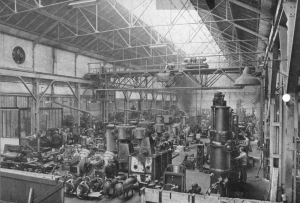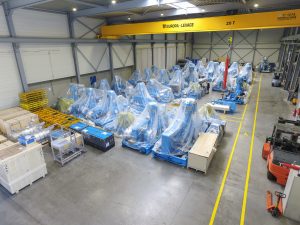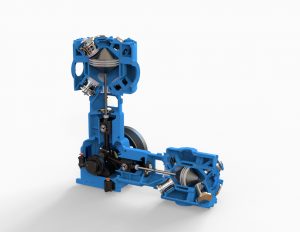The beating heart of the bottling line
Georges Alard, Commercial Director AF Group, on the company’s 150th anniversary, the philosophy of looking forward and a look at developments in the PET compressors segment
When AF Compressors was founded in Belgium in 1870, the patent specification for the first PET bottles was still a hundred years away. Back then, the privately-owned company produced pneumatic hammers for the mining industry, i.e. for use in the construction of tunnels and galleries for coalmines. During the early 1980’s, AF’s first 40 bar oil free reciprocating air compressors were manufactured for blowing PET bottles – a market on which the company soon concentrated all its energies.
PETplanet: First of all, congratulations on the 150 years of Ateliers François! How has the anniversary year gone for you so far?
Alard: We started to consider this important milestone of the company during the Drinktec exhibition in 2018. Plans for our new larger service facilities to be situated close to Liège Airport were well advanced, together with a larger investment budget in research and development, so this coming jubilee year was to be the highlight of our company progress.
Needless to say, who could have forecast the global impact of Covid-19 in 2020. However, we remain strong, our sales and service coverage is fully operational for all countries and customers that are themselves struggling to overcome the disruption of Covid-19. Traditional sales and marketing methods for communicating our abilities and equipment such as trade fairs during our jubilee year have sadly been put on hold. No Gulfood Manufacturing, no Brau Beviale and others which we regularly attend. So 2021 will be considered as a recovery starting point. AF have experienced quite a few recovery starting points since 1870.
PETplanet: In 150 years, the company has gone through some difficult times such as wars, world economic crises or even pandemics like the Spanish flu. How has the current Covid-19 crisis affected the company?
Alard: Due to our long-term strategy of having daughter companies or sales and service agencies covering the majority of countries worldwide, the impact of Covid-19 has not been as severe as it could have been. Although international air travel is severely limited, our local technicians are still able to service the customers equipment on site; where there is a local lockdown we can send parts and assist remotely for maintenance thanks to UMI (User Maintenance Instructions) procedures. Of course, we are seeing a slowdown in new investments, however the aftermarket income is still holding showing that the PET industry is still in business. Meanwhile, sustainability and innovation management has been an integral part of AF since the 19th century – always looking forward to getting through challenging times targeting medium- and long-term achievements.
PETplanet: Originally, when AF was founded in Liège, Belgium in 1870, the company manufactured compressors and motors for the mining and steel industry. Can you briefly outline how the path from the mining business to PET bottles took place and share a few milestones?
Alard: In the early 1900’s AF was suppling heavy steel industry and other industrial activities. In the 1960’s the first oil-free compressors were produced, for chemicals, glass industry, breweries. One of the very first customers requiring a PET compressor was SPA Monopole S.A. in the Belgian Ardennes in Liège Province. And today, we are still proud to service and supply their mineral water facilities.
PETplanet: It was oil-free compressors since the 1960’S and since then, for more than 30 years, AF has been producing the 40 bar oil-free piston compressors for blowing PET bottles. By light weighting the bottles, air pressure requirements fell. Also, some machinery manufacturers integrated air recovery systems in their stretch-blow moulding machinery. How has this affected the further development of your compressors?
Alard: As you say, for 30 years we have been producing 40 bar oil free compressors for PET bottles. AF is perhaps unique compared to other compressor manufacturers in as much as we have concentrated virtually all of our energy into that market: working closely with the blowing machinery manufacturers, sometimes partnering joint development solutions, and closely following trends in drink consumption. Many of our earlier developments related to air recovery systems have been envied and copied by others. I must add that confidentiality and trust between AF and the blowing manufacturers is paramount, we are well known for keeping their confidences, which is one of the reasons we are able to work so closely with them.
The compressor of course is the beating heart of the bottle line. If that fails, the line stops; if it cannot give pressure, the line stops; if the compressors ancillaries are not correctly matched or fail, the line stops. So we must look at every possible consequence when new developments are initiated. It is right that light weighting the bottles has resulted in lower blowing pressures. This meant compression ratios would be changed between compression stages. What effects had to be considered? The compressor cooling system had to be revised, could we lower the motor power? Lower pressures mean larger air dryers as more volume passes through them, which ultimately means more capital cost and more power to achieve the specification of air quality. So, everything must be taken into consideration before its introduction and we have encouraged close dialogue in the past, now, and in the future with those blow moulding equipment manufacturers who value environmental and sustainable developments.
PETplanet: Can you also tell us what developments/improvements are next on the agenda?
Alard: Over the last two years the plastic industry has faced a barrage of negativity, however common sense recognised that the plastic bottle was not the common enemy and PET bottle lines are still increasing worldwide. Beverage companies are now looking to use up to 100% recyclable material so we cannot see any market shift short term towards new technology or bottle material design especially in the Covid-19 era. Beverage companies will be looking at maintaining margins and keeping their customer base in a world where the hospitality / tourism industry is on its knees. I see for the immediate future a lower capital expenditure on new machinery but a higher income from maintenance and retrofits to keep the older machinery going. We already have installed a dedicated upgrade department and identified customers who can benefit from upgrades.
PETplanet: When is retrofitting worthwhile and when do you recommend a customer to invest in a new compressor?
Alard: That is not such an easy question to answer. Piston compressors can go on for decades with the correct maintenance regime unlike other types of compressors which can have a finite lifetime. We have compressors still operating after over 30 years in adverse conditions. However, the longer the compressor is operational (we are talking years), the more difficult it becomes to satisfy the consumable spares supply, likewise also electronics quickly become obsolete compared to mechanical parts. Another reason for a company to keep its compressor running is familiarity, they don’t want to change, the owner loves it, the maintenance staff don’t want to learn about a new machine…. Many excuses.
So we take the view that 10 years is a good time period to review with the customer the options open to him. We would recommend a system audit. Can it be improved by a new management system for example? Would a new compressor take the place of two older units? It’s the closeness, the partnership, with our customers that AF pride themselves on, that we not only can have these types of discussions whilst maintaining and expanding our customer base.
PETplanet: If retrofitting is the customers’ choice to update an older compressor in an energy-efficient way – what options do they have?
Alard: We have several options. It could be mechanical, by retrofitting the latest designs of mechanical compression parts, or cooling systems. Electrical, by replacing old PLC’s with the latest versions. Systems, by looking and analysing operational loads and powers. Heat recovery systems, either retrofitted or plug and play. Management control systems. As I have said previously, we have a dedicated department whose sole function is looking at customer upgrades.
PETplanet: As you mentioned earlier, this year AF will not be attending Brau Beviale due to Covid-19. What would you have presented if you had been in Nuremberg this year?
Alard: Recently AF has re-designed and developed our two stage industrial compressors into a larger, more energy efficient range based on our phenomenally successful PET compressor frames. Highly competitive power to capacity rates make the reciprocating compressor very desirable to own and operate when electrical energy costs are rising. These two-stage oil free compressors marketed as our OPC range can operate in the normal 7 to 10 bar industrial standard and we have options for 3 to 15 bar units for specialised applications. Low pressure units, two stage oil-free compressor for 8 and 10 bar (from 3 to 15 bar).
So apart from presenting our OPC range we would be promoting more prominently our new “All in One,” a system which can deliver simultaneously high and low pressure from a single 3 stage compressor. This multi flexible use compressor is a creative opportunity for customers to reduce Capex and Opex in a significant way. This system is protected by an international patent.
PETplanet: AF currently has installations in more than 175 countries. Geographically speaking, what is the focus in terms of expansion?
Alard: To begin with, there is the “traditional” Greater Middle-East. AF Middle-East was already settled in the Jebel Ali Free Trade Zone but last year AF became owner of its own facilities, with spare parts components to market and service the Greater Middle East, Eastern Africa, and the 5 Stan (Kazakhstan, Kyrgyzstan, Tajikistan, Turkmenistan and Uzbekistan).
So, next to the “traditional” Greater Middle-East, Asia, and Africa mature markets, Europe and Africa are presently very active … But each and every country and regions require a quick and rapid service, and therefore we cannot afford to neglect any zone, there is no such thing as a “small” customer, there is no “second category” geographic sector.
PETplanet: Thank you very much for Mr Alard, and all the best to AF and its 150 years jubilee!

